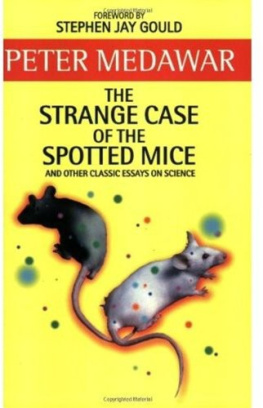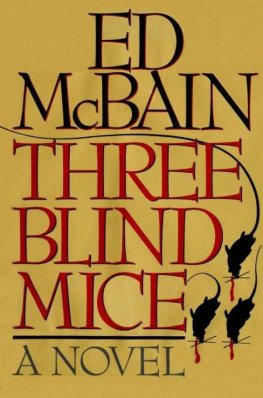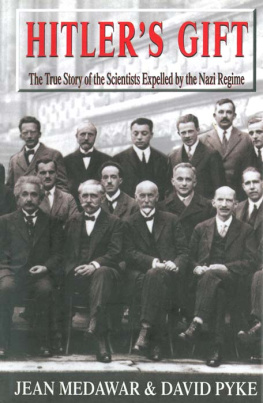Peter Medawar - The Strange Case of the Spotted Mice: and Other Classic Essays on Science
Here you can read online Peter Medawar - The Strange Case of the Spotted Mice: and Other Classic Essays on Science full text of the book (entire story) in english for free. Download pdf and epub, get meaning, cover and reviews about this ebook. year: 1996, publisher: Oxford University Press, USA, genre: Science. Description of the work, (preface) as well as reviews are available. Best literature library LitArk.com created for fans of good reading and offers a wide selection of genres:
Romance novel
Science fiction
Adventure
Detective
Science
History
Home and family
Prose
Art
Politics
Computer
Non-fiction
Religion
Business
Children
Humor
Choose a favorite category and find really read worthwhile books. Enjoy immersion in the world of imagination, feel the emotions of the characters or learn something new for yourself, make an fascinating discovery.
- Book:The Strange Case of the Spotted Mice: and Other Classic Essays on Science
- Author:
- Publisher:Oxford University Press, USA
- Genre:
- Year:1996
- Rating:5 / 5
- Favourites:Add to favourites
- Your mark:
- 100
- 1
- 2
- 3
- 4
- 5
The Strange Case of the Spotted Mice: and Other Classic Essays on Science: summary, description and annotation
We offer to read an annotation, description, summary or preface (depends on what the author of the book "The Strange Case of the Spotted Mice: and Other Classic Essays on Science" wrote himself). If you haven't found the necessary information about the book — write in the comments, we will try to find it.
Peter Medawar: author's other books
Who wrote The Strange Case of the Spotted Mice: and Other Classic Essays on Science? Find out the surname, the name of the author of the book and a list of all author's works by series.
The Strange Case of the Spotted Mice: and Other Classic Essays on Science — read online for free the complete book (whole text) full work
Below is the text of the book, divided by pages. System saving the place of the last page read, allows you to conveniently read the book "The Strange Case of the Spotted Mice: and Other Classic Essays on Science" online for free, without having to search again every time where you left off. Put a bookmark, and you can go to the page where you finished reading at any time.
Font size:
Interval:
Bookmark:
Peter Medawar
Foreword by
Stephen Jay Gould
Oxford New York
OXFORD UNIVERSITY PRESS
-iii-
Oxford University Press, Walton Street, Oxford OX2 6DP Oxford New York Athens Auckland Bangkok Bombay Calcutta Cape Town Dar es Salaam Delhi Florence Hong Kong Istanbul Karachi Kuala Lumpur Madras Madrid Melbourne Mexico City Nairobi Paris Singapore Taipei Tokyo Toronto and associated companies in Berlin Ibadan
Oxford is a trade mark of Oxford University Press
The Estate of Peter Medawar 1961, 1963, 1964, 1965, 1966, 1968, 1969, 1972, 1976, 1977, 1979, 1980, 1982, 1983, 1984, 1986 This selection the Estate of Peter Medawar 1996
First published as an Oxford University Press paperback 1996
All rights reserved. No part of this publication may be reproduced, stored in a retrieval system, or transmitted, in any form or by any means, without the prior permission in writing of Oxford University Press. Within the UK, exceptions are allowed in respect of any fair dealing for the purpose of research or private study, or criticism or review, as permitted under the Copyright, Designs and Patents Act, 1988, or in the case of reprographic reproduction in accordance with the terms of the licences issued by the Copyright Licensing Agency. Enquiries concerning reproduction outside these terms and in other countries should be sent to the Rights Department, Oxford University Press, at the address above
This book is sold subject to the condition that it shall not, by way of trade or otherwise, be lent, re-sold, hired out or otherwise circulated without the publisher's prior consent in any form of binding or cover other than that in which it is published and without a similar condition including this condition being imposed on the subsequent purchaser
British Library Cataloguing in Publication Data Data available
Library of Congress Cataloging in Publication Data Data available
ISBN 0-19-286193-X
10 9 8 7 6 5
Typeset by Best-set Typesetter Ltd., Hong Kong Printed in Great Britain by Mackays Chatham, Kent
-iv-
The Phenomenon of Medawar
Stephen Jay Gould
Peter Medawar was a paragon of rationalism. I have never met a man more committed to that combination of logic and common sense that we call science at its best. I have also never met a tougher or more confident man. Reason and fortitude forge an unbeatable combination. One personal story: I attended a scientific meeting with Peter Medawar after a stroke had made half his body virtually unusable. We had to move from the thirdfloor lecture room to the basement restaurant -- and the building had no elevator. Peter could only go down stairs backwards, and slowly. Most people in his condition would have meekly waited for everyone else to descend and then painfully made their own way down, no doubt missing half the lunch by late arrival. Peter was the star of the meeting -- and he knew it. He went down first, one step at a time, slowly as could be -- and everyone followed at his pace. How entirely right and proper, we all agreed.
Peter Medawar was also a paragon of humanism -- and this form of compassion took the edge off the occasional harshness of his rationalism. He loved people and their foibles, and he loved to laugh. He was a true philosopher, but he also reminded me of the fellow in Johnson's famous quip about the man who wanted to be a philosopher, but failed because cheerfulness was always breaking through. Another personal story: A year or two after the British forum with the luncheon descent, Peter and I attended another meeting in Minnesota. He had suffered another stroke, and was now confined to a wheelchair. Meanwhile, I had come down with an apparently incurable cancer. Peter was my guru
-v-
and I wanted, more than anything else at the meeting, to ask him as an immunologist by trade, and especially in the light of his own severe problems of health, how and whether, in his opinion, attitude might help in the palliation or remediation of physical illness. So I asked him what traits of character or action might help and he replied simply: 'a sanguine personality'. We both benefited by his judgment, having been endowed for whatever reason with such a view of the world. I recovered, and he lived far longer (and better) with half a body than the vast majority of people could ever hope to survive with all systems functional.
This toughness, combined with compassion and good humor, represents the persona that a commitment to rationalism is supposed to induce, but so rarely does (for personal philosophy does not always overcome personal insecurity). The dispelling of illusions, and acceptance of the world as we actually find it (rather than as we could wish it to be) should be profoundly liberating, though not always joyous. These views underlie the great Spinozistic notion -- the deep meaning of true liberty to a philosophic determinist (as the extreme), or simply to one who does not deny the constraints of objective reality -- that 'freedom is the recognition of necessity'. With such acceptance, one can be truly sanguine and accept all the outrageous slings and arrows of life's misfortune with both good grace and good humour. A fine idea -- although most people don't have the internal strength to embody the consistent philosophy. But Peter Medawar did. Let him speak for himself:
What matters is not to be defeated. I do not regard myself either as a victim or a beneficiary of divine dispensations, and I do not believemuch though I should like to do so -- that God watches over the welfare of small children in the way that small children need looking after (that is, as fond parents do, and paediatricians, and good schoolteachers). I do not believe that God does so because there is no reason to believe it. I suppose that's just my trouble: always wanting reasons.
In a world awash in new-age mysticism and old-fashioned, pervasive anti-intellectualism, it may be something of a clich
-vi-
to point out that salvation requires rationalism now more than ever. Equally obviously, such salutary, attitudes need to be embodied in passionate and persuasive individuals, not only in abstractions or collectivities. In this sense, although independently minded intellectuals like myself are not supposed to have gurus, I don't mind admitting that Peter Medawar was, for me, closest to that status of more than mere mentor. I was not blind to his faults (and will mention some later on), but I never met more qualities that I wanted to emulate all rolled up into one person. It goes without saying that Peter Medawar, Nobel laureate for work in immunology, was a pre-eminent biologist. But he was also a great intellectual and committed rationalist, a firm moralist with a redeeming sense of humour, and a wonderful writer especially gifted with the skill to turn a fine phrase. These combined qualities, so rarely conjoined in a single individual, made Medawar our century's greatest spokesman for the power and humanity of science. Just consider a pair of his bon mots: first, an incisive comment on psychobabble in the search for intrinsic meaning in dreams:
those who enjoy slopping around in the amniotic fluid should pause for a moment to entertain (perhaps only unconsciously in the first instance) the idea that the content of dreams may be totally devoid of 'meaning'.
Or this, in a kinder mode, on the difference between art and science:
Wagner would certainly not have spent twenty years on The Ring if he had thought it at all possible for someone else to nip in ahead of him with Gtterdmmerung.
I have frequently argued (see my books Bully for Brontosaurus and Eight Little Piggies
Font size:
Interval:
Bookmark:
Similar books «The Strange Case of the Spotted Mice: and Other Classic Essays on Science»
Look at similar books to The Strange Case of the Spotted Mice: and Other Classic Essays on Science. We have selected literature similar in name and meaning in the hope of providing readers with more options to find new, interesting, not yet read works.
Discussion, reviews of the book The Strange Case of the Spotted Mice: and Other Classic Essays on Science and just readers' own opinions. Leave your comments, write what you think about the work, its meaning or the main characters. Specify what exactly you liked and what you didn't like, and why you think so.













